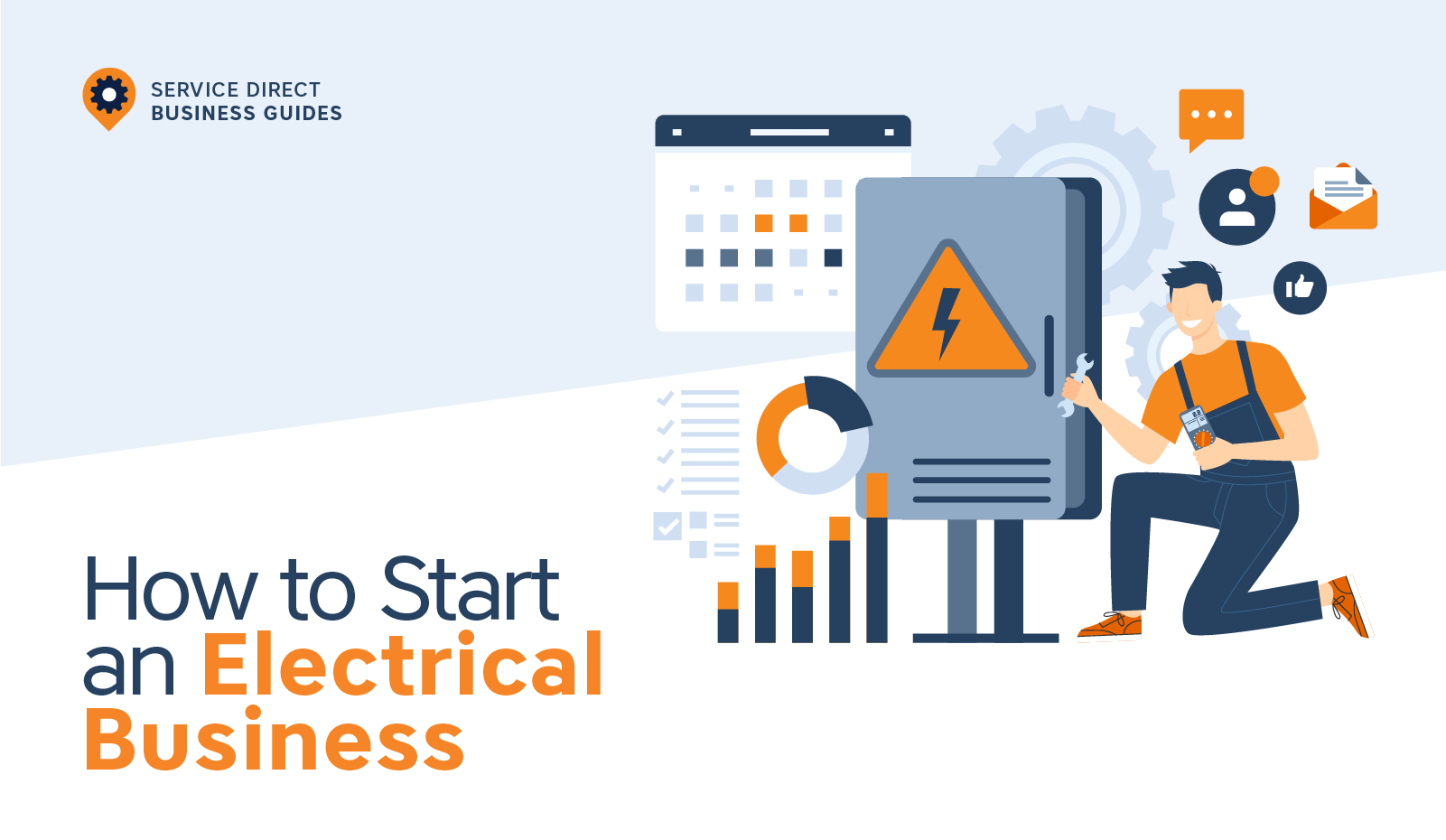How to Start an Electrical Business
Are you passionate about electrical work and dreaming of starting your own business? Look no further! This comprehensive guide is designed to help you navigate the exciting journey of launching your very own electrician business.
The demand for electrical services is ever-growing, making it an opportune time to venture into this rewarding industry. However, starting a business can be daunting, especially if you're new to entrepreneurship. That's why we're here to provide you with an easy-to-understand, in-depth roadmap to success.
In this blog, we'll walk you through each crucial step, from assessing the profitability of an electrician business to the essential licenses and qualifications you'll need to operate. We'll also explore the types of services you can offer as an electrician and share common mistakes to avoid along the way.
Whether you're a seasoned electrician looking to transition into business ownership or someone with a passion for electrical work seeking a new career path, this guide is tailored for you. So, let's dive in and discover the secrets to launching a thriving electrician business.
According to the Bureau of Labor Statistics, electricians make on average $60,000 per year, and the industry is expected to grow as fast as average over the next decade. In short, yes you can make money as an electrician and shouldn’t have to worry about that market diminishing.
Owning an electrician business can be profitable for several reasons:
- There is a consistent and growing demand for electrical services in the residential, commercial, and industrial sectors. No matter what, people are always going to need an electrician to help with their homes.
- Electrical work is complex and potentially hazardous, requiring proper training, knowledge of electrical codes, and adherence to safety standards. As a result, electricians are often seen as professionals, and clients are willing to pay for their expertise.
- Beyond the standard installation and repair services, electricians can capitalize on opportunities for upselling. This includes recommending energy-efficient lighting solutions, smart home installations, or electrical system upgrades to clients.
Of course, it’s important to remember that every business will have varying levels of success due to varying factors such as location, expertise, competition, and services offered. All this means is that you need to look critically at the other similar businesses in your area to determine where you might fit into the market.
What Types of Services Should Electricians Offer?
Electricians can offer a range of services to cater to the diverse needs of their clients. Here are some common types of services that electricians should consider offering:
- Electrical Installations: You’ll want to offer wiring installations, lighting installations, electrical panel installations, and more.
- Troubleshooting and Diagnostics: You should diagnose and fix electrical issues, such as power outages, faulty wiring, or malfunctioning circuits.
- Electrician Repairs: You should repair or replace damaged outlets, switches, and electrical sockets as well as address issues with circuit breakers, including tripped breakers, faulty connections, or overload problems.
- Upgrades and Renovations: You can help clients upgrade their electrical systems to accommodate increased power demands, such as adding new circuits or increasing the capacity of the electrical panel.
- Energy-Efficient Solutions: Offering energy-efficient lighting options, such as LED lights, can help clients save on energy costs and reduce their environmental footprint.
- Smart Home Upgrades: Electricians can install smart home devices and systems, including smart lighting, thermostats, security systems, and home automation solutions.
- Safety Inspections: You can perform thorough inspections of electrical systems to ensure homes meet safety standards and identify potential hazards.
- Specialized Services: By focusing on offering renewable energy solutions and other specialized services like electric car charger installation, you can stay ahead of the curve.
Remember that the specific services your electrician company offers may vary depending on factors such as local regulations, industry trends, and your expertise. It's essential to assess the market demand and choose services that meet the needs of your potential customers.
Licensing and Other Qualifications for Electricians
When starting an electrical business, it's essential to understand and comply with the licensing requirements specific to your jurisdiction. While the specific licenses can vary, here are some common licenses that electricians may need:
- Electrician License: Many regions require electricians to obtain a journeyman electrician license. This license demonstrates competency and allows individuals to work independently as an electrician.
- Contractor License: In some areas, electricians who plan to operate their own business or provide services as a contractor may need to obtain an electrical contractor license. This license is separate from the individual electrician license and permits the business to legally offer electrical services.
- Business License: Depending on your jurisdiction, you may need a general business license or permit to operate legally. This license ensures compliance with local regulations and requirements for running a business.
- Specialty Licenses: Additional licenses may be required for certain specialized services. For example, if you plan to offer services such as renewable energy installations or EV charging station installations, you may need specific licenses or certifications related to those areas.
It's crucial to research the specific licensing requirements in your area and contact the relevant licensing board or regulatory authority. They can provide detailed information about the licenses needed to start an electrical business in your jurisdiction.
Keep in mind that the requirements can vary significantly, so it's important to stay informed and ensure compliance to operate your business legally and ethically.
Avoid These Mistakes When Starting Your Electrician Company
When starting an electrician business, it's important to be aware of common mistakes that inexperienced business owners often make, especially with 20% of small businesses failing in their first year.
By understanding these pitfalls, you can proactively avoid them and increase your chances of success.
Here are some common mistakes to watch out for:
- Insufficient Business Planning: If you don’t create a detailed business plan that outlines your goals, target market, marketing strategies, financial projections, and operational processes, it can lead to disorganized and inefficient business operations.
- Inadequate Financial Management: Failing to accurately estimate the initial costs as well as ineffective budgeting can result in difficulties in covering day-to-day expenses or unexpected costs.
- Neglecting Marketing and Branding: Failing to develop a marketing strategy and actively promote your services can limit your visibility and hinder your ability to attract clients. Also, neglecting to establish an online presence through your website and social media platforms can make it harder for potential customers to find and trust your business.
- Inadequate Customer Service: Failing to communicate effectively with clients, including not returning calls, not answering the phone, and failing to return emails promptly, can create a negative impression and damage your reputation.
- Underestimating Administrative Responsibilities: Not staying informed about changes in electrical codes, safety regulations, and licensing requirements can result in non-compliance and legal issues.
- Inadequate Focus on Skills Development: Neglecting to stay updated with the latest industry advancements and not expanding your skill set can hinder your ability to provide high-quality services and meet client expectations.
By being aware of these common mistakes and taking proactive steps to address them, you can set a solid foundation for your electrician business and increase your chances of long-term success.
Step-by-Step Guide to Starting Your Electrical Company
Starting your own electrical business takes a lot of planning and forethought. But once you've considered the profitability, basic requirements, and common pitfalls, how exactly do you go about forming and launching a business?
These 11 key steps are a great place to start when forming your own electrical company:
- Conduct market research on the local electrician market
- Write a clear and thorough business plan
- Register your business with the state
- Get the necessary insurance and liability coverage
- Open a separate bank account for your business
- Set up a workspace
- Purchase quality equipment
- Hire great employees
- Develop a marketing strategy
- Build relationships within the industry and the local community
- Provide excellent customer service
For a deeper dive into this process and detailed recommendations for each step, check out our comprehensive Step-By-Step Guide to Starting an Electrical Business.
Conclusion
It’s clear that starting an electrician business can be a profitable and fulfilling endeavor, especially with the high demand for electrician services that is expected to remain consistent.
By avoiding common mistakes, you can position your electrician company for long-term success in the dynamic and rewarding field of electrical services. For even more detailed information on how to start your electrician business today, download our step-by-step guide!





